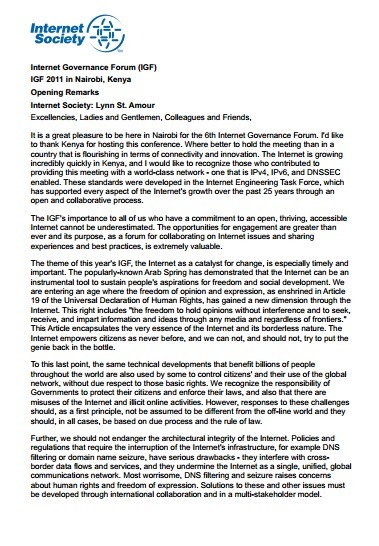Internet Governance Forum (IGF) 2011 Nairobi, Kenya
Opening Remarks, Internet Society, Lynn St. Amour
Excellencies, Ladies and Gentlemen, Colleagues and Friends,
It is a great pleasure to be here in Nairobi for the 6th Internet Governance Forum. I’d like to thank Kenya for hosting this conference. Where better to hold the meeting than in a ountry that is flourishing in terms of connectivity and innovation. The Internet is growing incredibly quickly in Kenya, and I would like to recognize those who contributed to providing this meeting with a world-class network – one that is IPv4, IPv6, and DNSSEC enabled. These standards were developed in the Internet Engineering Task Force, which has supported every aspect of the Internet’s growth over the past 25 years through an open and collaborative process.
The IGF’s importance to all of us who have a commitment to an open, thriving, accessible Internet cannot be underestimated. The opportunities for engagement are greater than ever and its purpose, as a forum for collaborating on Internet issues and sharing experiences and best practices, is extremely valuable.
The theme of this year’s IGF, the Internet as a catalyst for change, is especially timely and important. The popularly-known Arab Spring has demonstrated that the Internet can be an instrumental tool to sustain people’s aspirations for freedom and social development. We are entering an age where the freedom of opinion and expression, as enshrined in Article 19 of the Universal Declaration of Human Rights, has gained a new dimension through the Internet. This right includes “the freedom to hold opinions without interference and to seek, receive, and impart information and ideas through any media and regardless of frontiers.” This Article encapsulates the very essence of the Internet and its borderless nature. The Internet empowers citizens as never before, and we can not, and should not, try to put the genie back in the bottle.
To this last point, the same technical developments that benefit billions of people throughout the world are also used by some to control citizens’ and their use of the global network, without due respect to those basic rights. We recognize the responsibility of Governments to protect their citizens and enforce their laws, and also that there are misuses of the Internet and illicit online activities. However, responses to these challenges should, as a first principle, not be assumed to be different from the off-line world and they should, in all cases, be based on due process and the rule of law.
Further, we should not endanger the architectural integrity of the Internet.
Policies and regulations that require the interruption of the Internet’s infrastructure, for example DNS filtering or domain name seizure, have serious drawbacks – they interfere with cross-border data flows and services, and they undermine the Internet as a single, unified, global communications network. Most worrisome, DNS filtering and seizure raises concerns about human rights and freedom of expression. Solutions to these and other issues must be developed through international collaboration and in a multistakeholder model.
I’d like to make some final comments on the development theme. All the Internet organizations participating here today are dedicated to ensuring a ubiquitous, reliable, and sustainable Internet that is equal in all countries; one where developing countries are on a par with the rest of the world. To do this and to create lasting economic and societal impact, Internet development and governance must be open, transparent, and inclusive.
The success of the Internet itself and the undeniable benefits it has brought to mankind, clearly supports this model of Internet governance. And Internet users worldwide continue to have high hopes and expectations for a participatory Internet. In a recent global survey of Internet users conducted by the Internet Society, nearly 9 out of 10 respondents indicated that the Internet has a role in solving global issues, including the achievement of the UN Millennium Development Goals.
We all have a role – individuals, governments, private sector, civil society – and we all need to learn how to work together in this new world. Yet, disturbingly, there are many indications that we are headed to a world where governments increasingly seek to define our communications environment, severely restricting multi-stakeholder participation and, ultimately, the Internet’s long-term development.
The global Internet has always been shaped by individuals. Empowering every individual on this earth to fully participate in its evolution, if they so choose, is critical to our collective well-being, and to creating the best possible Internet and the best possible society.
Thank you for the opportunity to address you today.
